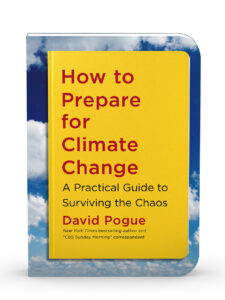 David Pogue will talk about the subject covered in his upcoming book, “How to Prepare for Climate Change.“ He notes that “the number of people who believe that the climate is not changing are dwindling, and it’s currently about 12% of Americans. Twice that number believe that aliens walk among us. There may still be people who believe that the changing climate is not human-caused, or maybe you believe it is human-caused, or that it’s a natural cycle—but either way, you still need to prepare!”
David Pogue will talk about the subject covered in his upcoming book, “How to Prepare for Climate Change.“ He notes that “the number of people who believe that the climate is not changing are dwindling, and it’s currently about 12% of Americans. Twice that number believe that aliens walk among us. There may still be people who believe that the changing climate is not human-caused, or maybe you believe it is human-caused, or that it’s a natural cycle—but either way, you still need to prepare!”
 David is a technologist, columnist, entertainer and television reporter. From 2000 to 2013, he was the New York Times weekly tech columnist. After a five-year detour to Yahoo Finance, he now writes for the Times, WIRED, and OneZero on Medium. He’s a five-time Emmy winner for his stories on “CBS Sunday Morning,” a New York Times bestselling author, and a host of 20 science specials on “NOVA” on PBS. David is one of the world’s best-selling “how-to” authors, with more than 100 titles and 3 million copies in print. They include seven books in the “For Dummies” series, his Pogue’s Basics series of tips and shortcuts, and the Missing Manual series of computer books. David graduated summa cum laude from Yale in 1985 with distinction in music, and he spent ten years conducting and arranging Broadway musicals in New York. He has won a Loeb Award for journalism, and an honorary doctorate in music. He has been profiled on “48 Hours” and “60 Minutes,” and is regularly featured on “CBS Sunday Morning.”
David is a technologist, columnist, entertainer and television reporter. From 2000 to 2013, he was the New York Times weekly tech columnist. After a five-year detour to Yahoo Finance, he now writes for the Times, WIRED, and OneZero on Medium. He’s a five-time Emmy winner for his stories on “CBS Sunday Morning,” a New York Times bestselling author, and a host of 20 science specials on “NOVA” on PBS. David is one of the world’s best-selling “how-to” authors, with more than 100 titles and 3 million copies in print. They include seven books in the “For Dummies” series, his Pogue’s Basics series of tips and shortcuts, and the Missing Manual series of computer books. David graduated summa cum laude from Yale in 1985 with distinction in music, and he spent ten years conducting and arranging Broadway musicals in New York. He has won a Loeb Award for journalism, and an honorary doctorate in music. He has been profiled on “48 Hours” and “60 Minutes,” and is regularly featured on “CBS Sunday Morning.”
Arranged by Bryan Hooper
Bryan’s summary of the talk:
David Pogue led us through the background of the subject of climate change and described some of his ideas on how individuals can prepare to cope with the dislocating changes that are projected to occur.
Carbon dioxide levels in the atmosphere have fluctuated over the millennia, generally ranging from 180 to 280 parts per million, but have steadily risen over the past 150 years since the advent of the industrial revolution to a peak around 420 ppm. Accompanying that growth has been an increase in global mean temperature, which in turn has fueled changes in weather related phenomena, resulting in increased numbers of hurricanes, floods and wildfires, with consequent loss of life, property damage and other results, such as flooded farmland preventing the planting of crops.
David shared some of his ideas on how we should be preparing for the projected difficulties that will need to be faced:
- His first point concerned where to live. Sea levels are rising and threatening coastal dwellings: Miami is number one on the list of cities that will feel the main impact of inundation, and the projected regional outlook is resulting in the devaluation of Florida real estate. Water shortages are also a key concern in some areas – for example, the Hoover Dam is only one third full due to sustained drought. All things considered, his suggestion is to head above the 42nd parallel to the Great Lakes region. Relocation areas to consider are Cleveland, Madison, Burlington and Buffalo.
- Secondly, he considered where to invest. Reducing atmospheric carbon levels has spurred the development of renewable energy sources, such as solar and wind-power. Renewables energy production overtook coal-sourced energy output in 2020, and solar is now cheaper per watt than coal. Solar costs have fallen from $80 to 20¢ per watt since 1976. However, with the Chinese dominating the solar market there is little investment opportunity in that direction, and the recommendation is to invest in utilities supplying energy, as well as in water companies, farm equipment producers and in suppliers of components for electric vehicles.
- The third point he discussed is how to insure. Most independent flood insurance ended in 1992 as insurers withdrew from the business due to major losses from Hurricane Andrew, and FEMA now provides 95% of flood insurance through the National Flood Insurance Program. It is $25 billion in debt. A new scheme to be introduced in 2021 has been proposed to raise rates on lower-lying properties, and lower them on properties at higher elevations to reflect real risk. Implementation is scheduled for October 2021: watch this space…
- The fourth point he made is to be prepared. The advice covered an emergency “Go Bag” with food, flashlights and other survival necessities; preparation for emergency water sourcing; a power generator; hand-cranked device chargers; tick and mosquito deterrent; having a plan to keep in touch with your family and friends; owning a tactical flashlight to discourage the bad guys.
- Finally, David suggested we should hope. US gas emissions are declining due to using natural gas instead of coal. While the Federal government might take a hands-off approach, a number of cities are taking their own initiatives toward promulgating renewable energy resources. 250 global companies have committed to 100% use of renewables.
The video of the presentation can be accessed from the link blow, and to learn more detail about David Pogue’s ideas on the topic you can read his new book, “How to Prepare for Climate Change,“ which will be published in January 2021.
Video of presentation: https://youtu.be/7sZ2qdPOprI
